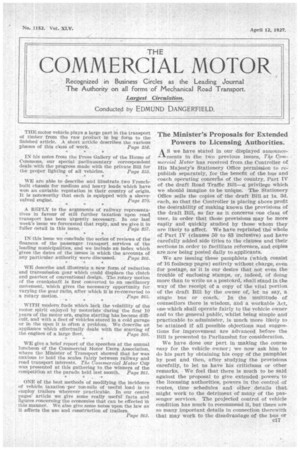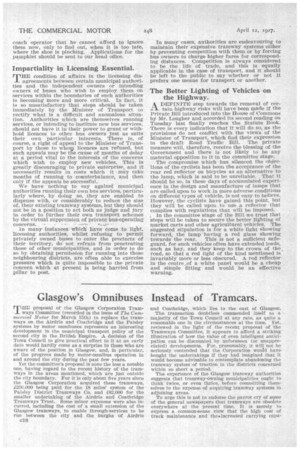The Minister's Proposals for Extended Powers to Licensing Authorities.
Page 39

Page 40

If you've noticed an error in this article please click here to report it so we can fix it.
A S we have stated in our displayed announce-01-ments in the two previous issues, Vie Cornmercial Motor has received from the Controller of His Majesty's Stationery Office permission to republish separately, for the benefit of the bus and coach operating concerts of the country, Part IV of the draft Road Traffic privilege which we should imagine to be unique. The Stationery Office sells the copies of the draft Bill at is. 3d. each, so that the Controller is placing above profit the desirability of making known the provisions of the draft Bill, so far as it concerns one class of user, in order that those provisions may he more easily and quickly studied by those whom they are likely to affect. We have reprinted the whole of Part IV (clauses 50 to 83 inclusive) and have Carefully added side titles to the clauses and their sections in order to facilitate reference, and copies are now being posted daily to applicants.
We are issuing these pamphlets (which consist of 16 foolscap pages) entirely without charge, even for postage, as it is our desire that not even the trouble of enclosing stamps, or, indeed, of doing more than to write us a postcard, shall stand in the way of the receipt of a copy of the vital portion of the draft Bill by the owner of, let us say, a single bus or coach. Jn the multitude of counsellors there is wisdom, and a workable Act, one which shall operate fairly to the vehicle owner and to the general public, whilst being simple and practicable to administer, is much more likely to be attained if all possible objections and suggestions for improvement are advanced before the Bill is presented to Parliamftt for consideration.
We have done our part in making the course easy for the vehicle owner ; we now ask him to do his part by obtaining his copy of the pamphlet by post and then, after studying the provisions carefully, to let us have his criticisms or other remarks. We feel that there is much to be said against the proposal to give extended powers to the licensing authorities, powers in the control of routes, time schedules and Other details that. might work to the detriment of many of the passenger services. The projected control of vehicle condition has much to recommend it, but there are so many important details in connection therewith that may work to the disadvantage of the bus or coach operator that he cannot afford to ignore them now, only to find out, when it is too late, where the shoe is pinching. Applications for the pamphlet should be sent to our head office. •
Impartiality in Licensing Essential.
THE condition of affairs in the licensing disagreements between certain municipal authorities and the independent owners or intending owners of buses who wish to employ them on services within the boundaries of such authorities is becoming more and more critical. In fact, it is so unsatisfactory that steps should be taken immediately by the Minister of Transport to rectify what is a diffietilt and anomalous situation. Authorities which are themselves running services, or intending to institute new bus services, should not have it in their power to grant or withhold licences. to other bus owners just as suits their own particular interests. There is, of course, a right of appeal to the Minister of Transport by those to who lit licences are 'refused, but such appeals may be the cause of months of delay at a period vital to the interests of the concerns which wish to employ new vehicles. This is greatly discouraging to private enterprise, and it necessarily results in costs which it may take months of running to counterbalance, and then only if the appeals be successful. We have nothing to say against municipal authorities running their own bus services, particularly where, by doing so, they are enabled to dispense with, or considerably to reduce the size of, their existing tramway systems, but they should not be in a position to act both as judge and jury in order to further their own transport schemes by the virtual suppression of private bus-operating Concerns. • • .• • • • in many instances Wiricli have come to licensing authorities, whilst refusing to permit privately owned buses to enter the precincts of their territory, do not refrain from penetrating those of other municipalities, and in order to do so by obtaining permission for running into those neighbouring districts, are often able to exercise pressure which is quite impossible to the private concern which at present is being harried from pillar to post. In many cases, authorities are endeavouring to maintain their expensive tramway systems either by preventing competition with them or by forcing bus owners to charge higher fares for correspoinring distances. Competition is always considered to be the life of trade, and this is equally applicable in the case of transport, and it should be left to the public to say whether or not it prefers one means for transport or another.
The Better Lighting of Vehicles on the Highway.
A DEFINITE Step towards the removal of cer tain highway risks will have been made if the Private Bill introduced into the House of Commons by Mr. Lougher and accorded its second reading on Tuesday last finally reaches the Statute Book. There is every indication that it will do so, as the provisions do not conflict with the views of the Minister of Transport, which find their expression in the draft Road Traffic Bill. The private measure will, therefore, receive the blessing of the Government and there is not likely to be any material opposition to it in the committee stage. The compromise which has silenced the °Weeiions of the cyclists has been the acceptance of the rear red reflector on bicycles as an alternative to the lamp, which is said to be unreliable, That it should be so, in these days of accumulated experience in the design and manufacture of lamps that are called upon to work in more adverse conditions on different types of vehicle, is not easy to believe. However, the cyclists have gained this point, but they will be called upon to use a reflector that complies with regulations that will be imposed. In the committee stage of the Bill we trust that steps will be taken to secure the better lighting of market carts and other agricultural vehicles. The suggested stipulation is fOr a white light showing forward, the lamp having a red glass showing towards the rear. This is not a sufficient safeguard, for such vehicles often have extended loads, such as hay, and they keep to the crown of the, road, so that a red light of the kind mentioned is invariably more or less obscured. A red reflector in the centre of a white panel would be a cheap and simple fitting and would be an effective warning.












































































































